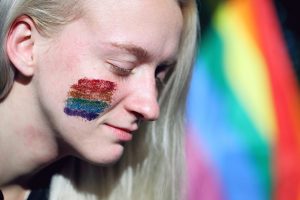People who classify themselves under the LGBTQ+ label—lesbian, gay, bisexual, transgender, etc.—lead difficult lives that can be confusing, stressful, and full of discrimination. Many of these individuals often face rejection or even abuse.
Because of their difficult lives, drug abuse is much more common among them—with 30% of the LGBTQ+ community abusing drugs or alcohol. Some may falsely believe simply that a gay or transgender identity correlates to substance abuse. But the truth lies in the problems people in LGBTQ+ face rather than the identity.
There are many problems that LGBTQ+ individuals face, but what do they face and why? What help can they find to alleviate these problems?
The Struggles of LGBTQ+
People who identify under LGBTQ+ labels are typically the center of hate crimes against the community. They face discrimination based on their sexual orientation in school, at work, or even at home amongst family. Many of these individuals tend to face rejection from peers, or even disowned if not physically and emotionally abused regularly.
In addition to the many outside forces, LGBTQ+ members also tend to struggle with self-acceptance and hatred. Because of discrimination from outside forces, many LGBTQ+ individuals find it difficult to accept and feel comfortable with their sexual identity.
Between rejection from society, friends, family, and even themselves, many in the LGBTQ+ community cope using drugs or alcohol. It is a common and easy way to try to escape pain, but one that can easily be overdone cause various health issues.
Barriers in LGBTQ+ Treatment
Familial rejection and abuse are sadly not the only problems that the LGBTQ+ community faces. Many tend to face discrimination in professional environments such as school, work, and even in healthcare.
LGBTQ+ members are often denied life needs such as insurance, job opportunities, marriage benefits, and other important needs. This, unfortunately, can include treatment and rehab for drug and alcohol addiction.
Some centers may turn down patients simply because of their sexual orientation or gender they identify by. But even if they do manage to get accepted, insurance tends to be the next common barrier. Some insurance companies may refuse coverage for addiction treatment for these individuals, and unfortunately, treatment is by no means cheap. Medical professionals and therapists can also choose to deny LGBTQ+ patients based on religious grounds.
Solutions for Treatment for LGBTQ+
While support for the LGBTQ+ community is limited, there are ways to find help.
First and foremost, finding support through family or friends in some form is a crucial part of recovery. These can be online friends or even distant relatives. Having emotional support from others can motivate addicts to continue treatment, or encourage them to try harder and do better.
 Though there may be locations that discriminate the LGBTQ+ community, there are treatment centers that specialize in working with LGBTQ+. These centers not only work to be inclusive but even offer additional support for the emotional battles that LGBTQ+ individuals face.
Though there may be locations that discriminate the LGBTQ+ community, there are treatment centers that specialize in working with LGBTQ+. These centers not only work to be inclusive but even offer additional support for the emotional battles that LGBTQ+ individuals face.
If you or a loved one is struggling with drug or alcohol addiction, contact a local Treatment & Rehab alternative in Tennessee. You might be interested in Discovery Place’s own treatment center alternatives, such as our 30 Day Residential Addiction Recovery Program or our Long Term Recovery Program in Burns, Tennessee. Call us for a free consultation at 1-800-725-0922.


